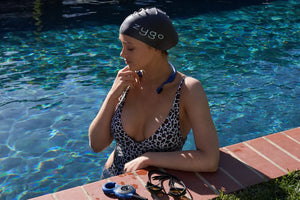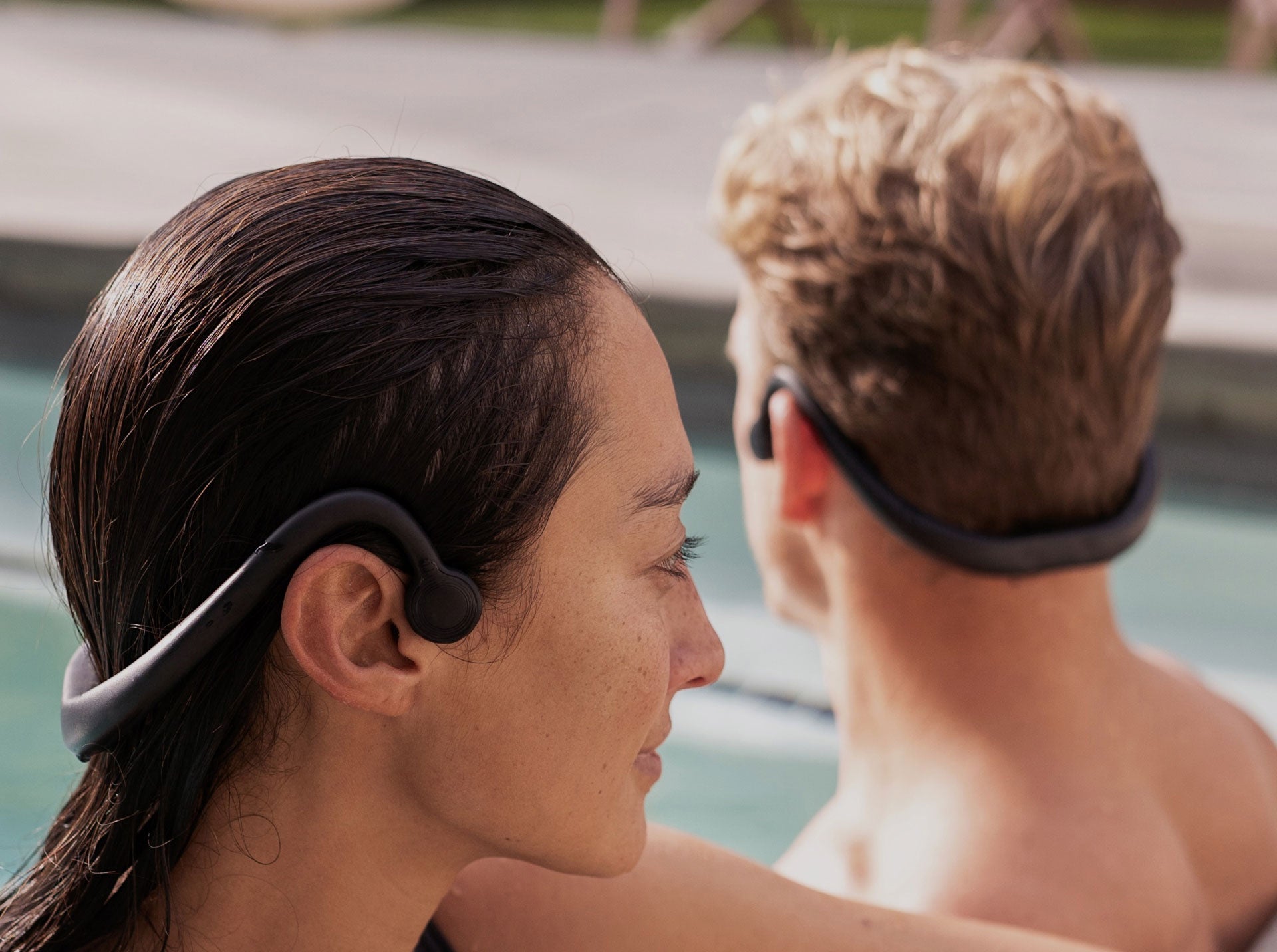How To Protect Hair When Swimming Everyday
So you’ve decided to take up swimming. Congratulations on choosing one of the most beneficial, healthy, and rewarding athletic activities you can spend your time doing!
Swimming has some truly incredible benefits for both your mental and physical health, but there is one potential drawback: the effects that chlorinated water can have on your hair and skin. What’s an enthusiastic swimmer to do?
We have all the vital details on how to keep doing the daily swim workouts you love, all while maintaining strong, healthy hair. In this article, we dive into the effects that chlorine can have on your hair, how you can protect yourself from those effects, and how to mitigate any damage already done.
What Are the Effects of Chlorine on Hair?
As the summer heat rolls in, many of us find ourselves drawn to the refreshing embrace of our local swimming pools. However, chlorine, a chemical essential for keeping pools clean and safe, can wreak havoc on our hair.
Swimming is an amazing workout, but unfortunately, it can have the following effects:
-
Dryness: Chlorine strips away your hair’s natural oils, potentially leaving it dry and brittle.
-
Discoloration: If you’re a blonde, watch out! Chlorine can cause discoloration and even turn hair a greenish hue if you’re spending a lot of time in the pool.
-
Damage: Repeated exposure to chlorine can lead to split ends and breakage.
Don’t worry, though; there’s no need to give up your poolside lifestyle! The negative effects of chlorine can be tamed.
With a few simple steps, you can minimize chlorine damage and keep your hair looking fabulous all summer long. Grab your swimsuit, underwater headphones, and towel, and let’s dive in!
How Do Swimmers Maintain Strong and Healthy Hair?
You might see Olympic swimmers who have long, luxurious, healthy locks. How do they do it when they are in the pool day in and day out? Truth be told, most elite swimmers wear swim caps for their aerodynamic effects and hair protection.
While swim caps are a solid choice, we can practically guarantee that those swimmers don’t just naturally have perfect hair. They are certainly taking advantage of some of the tips in this article.
How Can You Protect Your Hair From Chlorinated Water?
There are some tried and true methods you can use to safeguard your hair from chlorine’s damaging effects:
1. Wet Your Hair Before Swimming
Your hair is like a sponge. It’s porous and will absorb at least a certain amount of any substance that it comes in contact with. As a result, if it is already saturated with clean water, it will absorb far less chlorinated water. A quick shower before swimming in a pool is a good idea, regardless.
2. Try a Leave-in Conditioner
If you’ve never used a leave-in before, now might be the time to give it a try! A little lighter than your traditional hair conditioner, a leave-in conditioner is meant to stay on the hair after washing. When you apply a generous amount before going into the pool, you add a protective barrier between your hair and the chlorine.
3. Wear a Swim Cap
Do like the Olympians do! Donning a swim cap might seem a little weird at first, especially if you’re not used to it.
But we promise: around the pool, no one is going to give you any stares. Aside from protecting your hair, a swim cap will also keep your hair out of your face and eyes, which is especially helpful if you have long hair.
4. Rinse Right Away
After exiting the pool, make sure that you don’t let that chlorine linger! Be sure to rinse out that chlorine as soon as you get the chance.
5. Use a Clarifying Shampoo
While they are not something you should use every single day, a clarifying shampoo can be great to remove any chlorine buildup that has been collecting on your hair. Once a week, use a clarifying shampoo to do just that! Make sure not to overdo it, as these types of shampoos can be drying.
How Can You Fix Chlorine Damaged Hair?
Okay, so you didn’t read this article in time, and now it’s a little too late. If you already have some damage from chlorine, all hope is not lost. There are some things you can do to repair the damage done to your hair by chlorinated water.
Hair Masks
Hair masks can be done at home or at the salon. If you have hair that has been damaged by chlorine, you’ll want to opt for one that is deeply moisturizing and conditioning. If you’re more of a DIY person, you can find all kinds of recipes online for ones you can make yourself out of pantry ingredients like honey and avocado oil.
Protein and Keratin Treatments
Since chlorine can break down hair proteins, professional protein treatments can help rebuild and strengthen the structure of your hair. Keratin treatments help smooth and strengthen hair that has become dry and brittle. These treatments are best left to the professionals, so head to the salon if you decide to go this route!
Color Correction
For hair that has been discolored by chlorine, professional color correction treatments can help restore the original hue or correct any unwanted tones. Note: You absolutely do NOT want to opt for a box dye if you’re trying to repair chlorine-damaged hair.
Color correction is like the science of hair. It’s worth spending a little money at your local salon to get the job done right.
Regular Haircuts
Most people are aware that regular haircuts are essential when it comes to keeping hair healthy and strong. This is especially important if you are a regular at the swimming pool.
In cases of severe chlorine damage, a professional stylist may recommend trimming off the most damaged portions of your hair. But let’s take care of it so that we don’t get to that point!
Natural Oil Treatments
Use natural oils like argan oil, avocado oil, or coconut oil to moisturize and nourish your hair and scalp. These oils are rich in antioxidants that can help restore elasticity and prevent further damage.
The best way to do these treatments is to wet hair thoroughly, then apply the oil, focusing on the ends. Wrap hair up in a warm towel and let it sit for about 20 minutes, then shampoo and condition it like normal.
Avoid Excessive Heat Styling
If you’ve already got damaged hair, using heat to style it is only going to exacerbate the problem. Give your hair a break from heat styling tools while it’s recovering from chlorine damage.
Other General Healthy Hair Tips
According to the American Academy of Dermatology Association, there are a few other things you can do in order to keep your hair healthy, shiny, and strong.
These tips are great for anyone, not only those with chlorine-damaged hair:
-
Wash hair less often: There’s no need to wash your hair every single day. Dry or chemically treated hair should be washed no more than every other day, and some people can and should go as long as once or twice a week.
-
Use products that fit your hair type: For example, those who color their hair should use color-safe shampoos and conditioners. If your hair is dry from the pool, opt for extra moisturizing products.
-
Use products correctly: Shampoo should be used primarily for the scalp rather than for the entire length of the hair. Conversely, conditioner should be used mainly for the ends of the hair.
-
Use a silk wrap or bonnet for sleep: Users swear by silk bonnets to protect hair against breakage while sleeping. Fringe benefit? You protect your hair’s style, so you’ll look good when you wake up in the morning.
Conclusion
Hopefully, we were able to quell some of your apprehensions about chlorine and the damage it can wreak on your hair. While it’s certainly a factor, you can protect your hair by showering before your swim, wearing a swim cap, rinsing chlorine right away, and conditioning your hair.
In addition, treating it right with regular trips to the salon will keep your locks shiny and bright. Don’t let a little chlorine stop you from reaping all the fantastic benefits of a daily swim. Dive in and enjoy your workout!
Sources:
Does chlorine damage hair? Here's how to protect your hair this swim season | USA Today
5 Side Effects of Chlorine On Your Body | Health
Tips for Healthy Hair | American Academy of Dermatology Association


